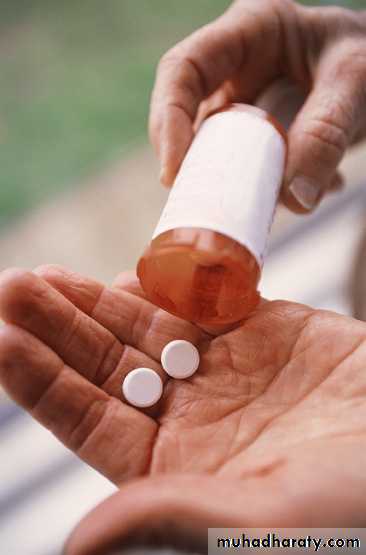PsychopharmacologyANTIPSYCHOTICS (NEUROLEPTICS)
ASS. PROFESSOR ARAFAT AL DUJAILIANTIPSYCHOTICS (NEUROLEPTICS)
General IssuesTreatment concerns
a. Most common cause of relapse is nonadherence
b. Most common reason for failure of treatment is inadequate dosage
c. Worse behavioral symptoms on antipsychotics, check for undiagnosed organic condition
Common uses
• Psychotic symptoms: hallucinations, alterations of affect, ideas of reference, delusions, etc.• Tourette's: haloperidol, pimozide, risperidone
• Movement disorders: Tourette, Huntington Chorea.
• Nausea and vomiting
• Intractable hiccups
• Pruritus
Mechanisms of action
• Dopamine blockage at postsynaptic receptors
• Alpha-adrenergic blockade; therefore, hypotensive effect
• Anticholinergic action by blocking the muscarinic receptors
• Blocks both NE re-uptake and serotonin and histamine receptors
Adverse effects
Neurologic effects• Anticholinergic effects: Dry mouth, Blurry vision, Constipation, Urinary retention, Delirium
• CNS effects: from antagonism of Hl receptors: Weight gain ,Sedation very common, Impaired memory
• Extrapyramidal (EP) reactions: due to decreased dopamine; appear in one-half of all patients in first few months
• Treat with benztropine, trihexyphenidyl,
diphenhydramine
4. Tardive dyskinesia (TD)
Non-neurologic effects Adverse effects
• Cardiovascular effects: orthostatic hypotension• Particular taste (also dental cavities)
• Vomiting common with long-term use, especially among smokers
• Sexual effects: prolactin elevated
• Men: decreased libido, inhibition of ejaculation, retrograde ejaculation
•Women: breast enlargement and lactation, changes in libido
• Altered bodily response to temperature
Typical versus Atypical Antipsychotics
Typical
Atypical
Dopamine
Dopamine and serotonin
Treats mostly positive symptoms
Treats positive and negative symptoms
More side effects
Fewer side effects
Haloperidol, Fluphenazine, Thioridazine
Clozapine, Risperidone, Olanzapine, Quetiapine, Aripiprazole

